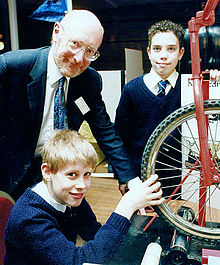Clive Sinclair
| Sir Clive Sinclair | |
|---|---|

Sinclair meeting young inventors in Bristol, England in 1992
|
|
| Born |
Clive Marles Sinclair 30 July 1940 near Richmond, Surrey |
| Occupation | Inventor, entrepreneur |
| Spouse(s) | Ann Trevor-Briscoe (1962–1985) Angie Bowness (2010–present) |
| Children | Belinda, Crispin, Bartholomew |
| Parent(s) | George William Carter Sinclair Thora Edith Ella Marles |
Sir Clive Marles Sinclair (born 30 July 1940) is an English entrepreneur and inventor, most commonly known for his work in consumer electronics in the late 1970s and early 1980s.
After spending several years as assistant editor of Instrument Practice, Sinclair founded Sinclair Radionics in 1961, where he produced the first slim-line electronic pocket calculator in 1972 (the Sinclair Executive). Sinclair later moved into the production of home computers and produced the Sinclair ZX80, the UK's first mass-market home computer for less than £100 , and later, with Sinclair Research, the ZX81 and ZX Spectrum; the latter is widely recognised for its importance in the early days of the British home computer industry.
Sinclair Research also produced the TV80 , a flatscreen portable mini television utilising an ingenious cathode ray tube however, LCD television technology was in advanced development and the Sinclair FTV1 (TV80) was a commercial flop, only 15,000 units being produced.
Knighted in 1983, Sinclair formed Sinclair Vehicles and released the Sinclair C5, a battery electric vehicle that was also a commercial failure. Since then Sinclair has concentrated on personal transport, including the A-bike, a folding bicycle for commuters that weighs 5.5 kilograms (12 lb) and folds down small enough to be carried on public transport.
Sinclair's father and grandfather were engineers; both had been apprentices at Vickers the shipbuilders. His grandfather George Sinclair was an innovative naval architect who got the paravane, a mine sweeping device, to work. George Sinclair's son, George William "Bill" Sinclair, wanted to take religious orders or become a journalist. His father suggested he train as an engineer first; Bill became a mechanical engineer and remained in the field. At the outbreak of World War II in 1939 he was running his own machine tools business in London, and later worked for the Ministry of Supply.
...
Wikipedia
